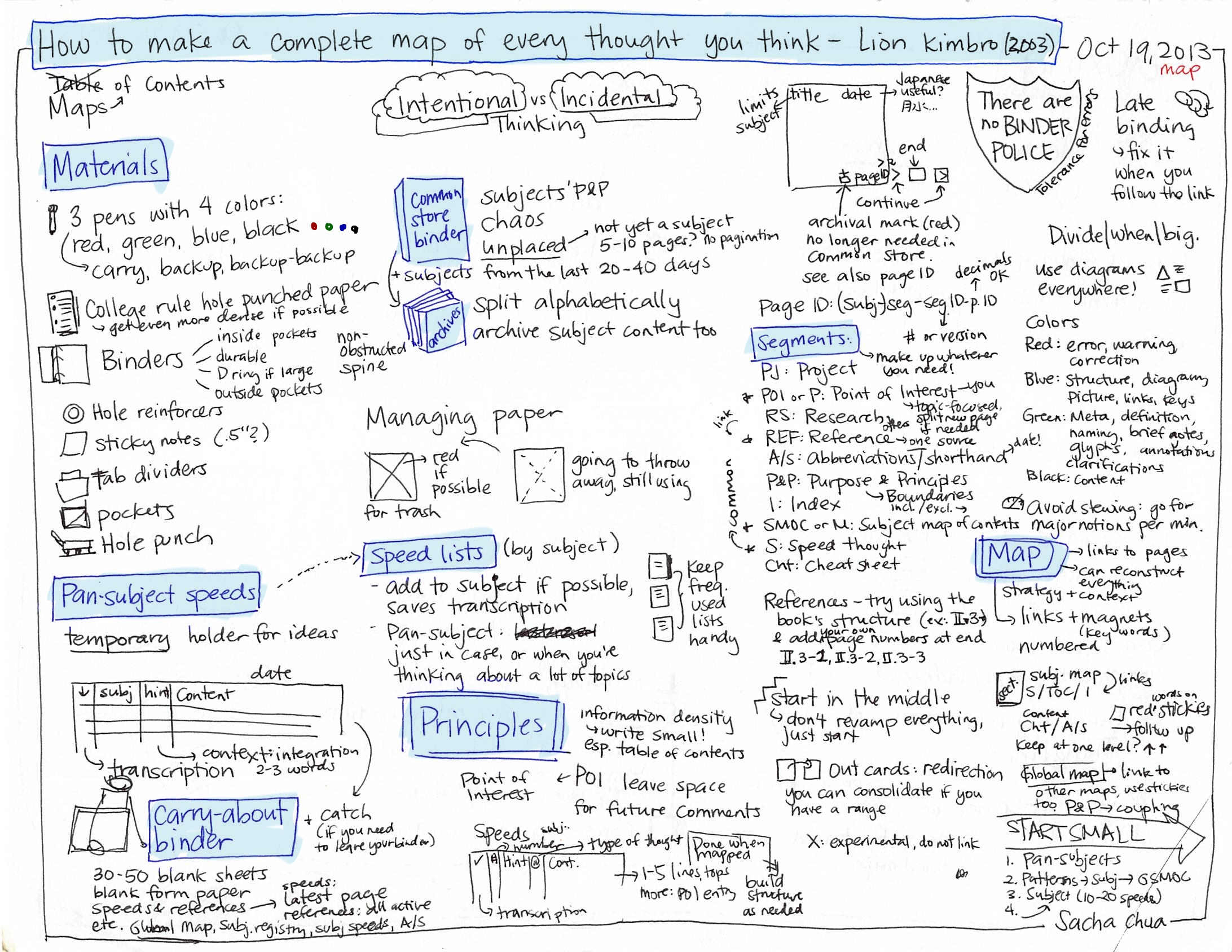Visual book review: How to make a complete map of every thought you think (Lion Kimbro)
Posted: - Modified: | pkm, learning, visual-book-notesI’m curious about how to take more effective notes, so I’ve been researching different systems. I came across Lion Kimbro’s experiment with mapping out his thoughts years ago. I finally sat down and condensed the free 131-page e-book on How to Make a Complete map of Every Thought You Think (2003) into this one-page summary. You can click on it for a larger version and print it out if you want.
Feel free to print, share, or modify this image! (Creative Commons Attribution License)
The book describes a system for taking quick notes and integrating them into subject-based sections in a larger binder, with some notes on managing your archive. It also gives tips on splitting large subjects and mapping out the connections between topics.
I’ve been using some of the book’s ideas on colour and icons, indicating TODOs with green boxes and structure with blue ink. Maps are handy too, although I tend to use computers so that I can link and rearrange easily. Both visual thinking and technology have come a long way since 2003, when Lion Kimbro wrote this book. With Evernote and the Fujitsu ScanSnap, I can scan my sketches and file them along with my blog posts and other notes. I back up my data so that I’m less worried about losing my archive, and I also keep my paper notes by date. I’ve started using Freeplane to build my global subject map, which I’ll cover in a future blog post. There are still some tech gaps, but things are pretty cool.
Want to learn more? You can check out my blog posts about learning. Tell me what you think or what you’re curious about!


5 comments
Prabu Ayyagari
2013-10-27T15:48:56ZHi Sacha - thanks for the refresher. I read Kimbro's book when it came out, but could not quite adapt it for my workflow. I'd be interested in learning your system as it is today, as it incorporates Evernote, Fujitsu Scansnap (and other tools). While I was very organized with tags and notebooks (and cross-references) when I started with Evernote (as an early adopter), these days it seems like I'm just using it as a big dumping ground, relying on its powerful OCR and search. Prabu Ayyagari (posting as a guest)
sachac
2013-10-30T02:36:47ZDaily drawing update has some notes on my workflow so far. Check that out and ask follow-up questions so that I can flesh out the notes further! =)
Erik Pischel
2013-10-29T12:35:27ZI remember reading that e-book. It's quite interesting although I think it is impossible to map every thought. I wonder whether the author still uses it today or did use it for a longer period. I estimate it would take an hour or so in the evening to go through all the stuff he recorded through-out the day and sort it. Every day.
Another thing that I remember is that he highlights the power of graphical maps: "Maps are basically the backbone of this whole operation that I'm describing." and "[Maps] are SO CRITICALLY IMPORTANT TO THIS WHOLE THING" and yet in the book, he don't write much about maps. Maybe because it's a text-only book. But you have to be aware of that.
Thanks for the nice sketch note!
Erik Pischel
2013-10-29T12:48:45ZTo anwer my own question, Kimbro himself states that his system is not for daily use:
"He freely admits that the system is less than
practical, and not intended to be used for a lifetime. And being
immobilised while writing notes means the writer has no time for much of
daily life.
"Yes, you do miss out on a lot of things. So I think it's best to get
the best of both worlds: I would recommend doing the notebook system
once or twice in your lifetime. I think I'll do it again, one day."
http://news.bbc.co.uk/2/hi/...
Guest
2013-10-29T12:47:18ZTo answer my question below, there is a BBC-News write-up on that books. Apparently, his system is not for daily use:
"He freely admits that the system is less than
practical, and not intended to be used for a lifetime. And being
immobilised while writing notes means the writer has no time for much of
daily life.
"Yes, you do miss out on a lot of things. So I think it's best to get
the best of both worlds: I would recommend doing the notebook system
once or twice in your lifetime. I think I'll do it again, one day."